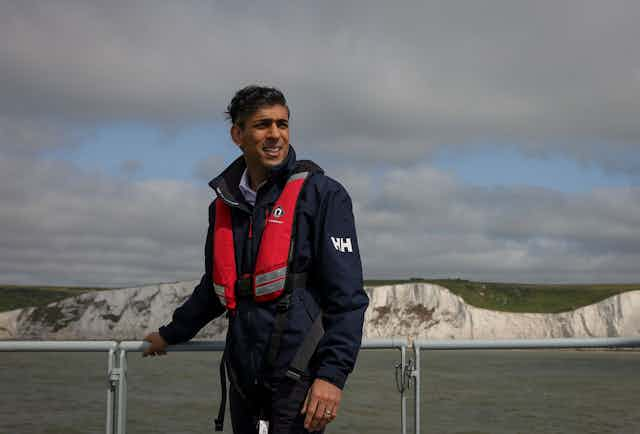Heading into an election year, the government’s handling of migration continues to dominate headlines. Much of the coverage has been about the plan to send those who enter the UK without legal paperwork to Rwanda.
This plan was enshrined in law in July 2023 through the Illegal Migration Act. However, after the UK Supreme Court deemed the plan unlawful, its future remains uncertain.
Despite this law’s significant effects on the lives of thousands of people – and wider UK society – the media coverage of its passage appeared to focus primarily on the politics of the issue and consequences for the government. As we found while analysing television news reports from when the bill was being debated in parliament, less focus was given to the substance of the policy and its implications for asylum seekers and human rights.
We argue that the media ought to take note of this issue as it continues to cover the government’s Rwanda policy.
News audiences have come to expect horse race coverage of politics ahead of elections. But this should not come at the expense of in-depth scrutiny of policy. When it does, it can have detrimental effects on the public’s understanding of important issues, leading to political polarisation and more partisan views.
The human and legal consequences of immigration rules are too important to be distilled to political infighting. To fulfil their obligations as public service broadcasters, the UK’s TV media outlets in particular should focus more on the policy, not the politics.
Party politics over scrutiny
Working with research assistant Ellie Baskerville at the School of Journalism, Media and Culture at Cardiff University, we examined 1,250 news items from the UK’s flagship evening television news bulletins (BBC News at Ten, ITV News at Ten, Channel 4 News, 5 News at 5 and Sky News at Ten) between March and July 2023. We looked specifically at weeks when the bill was being discussed in parliament.
The vast majority – 72% of stories – discussed the bill in relation to Westminster party politics. Specifically, how it would affect politicians’ reputations and prospects in the next election. Coverage was often more concerned with how the bill would fulfil Sunak’s pledge to “stop the boats”, than whether it would actually work or be implemented.
For example, when describing the legislative process, a Channel 4 reporter said that the government wanted to get the bill “done and dusted” before the election. While this is important context for understanding why the government was so focused on the policy, this overshadows reporting on the practicalities of the legislation.
Throughout the legislative process, critics of the bill (including MPs, legal experts and international organisations) raised concerns about how it could violate the UK’s legal obligations. But while most of the news items we examined referenced these obligations, they did not include a robust scrutiny of the legislation. In 30% of news items, journalists did not question whether the bill was legal.
Political sources accounted for 54% of the voices speaking in the news items reporting on the bill. Legal experts made up only 6%.
Channel 4 News stood out for including sources expressing open criticism of the legislation most often. This included, in March 2023, an asylum law expert who dismissed the bill as “a really impractical idea” emphasising the “completely unworkable” logistics associated with mass detention of asylum seekers pending removal.
The majority of criticism was not of the bill’s supposed human rights shortcomings, but of the legislation’s electoral implications. For example, on ITV News on July 3: “The prime minister wanted immigration to be an election battleground. What he’s got is a battle in his own party too.”
Personality over policy
The bill faced many challenges from peers in the House of Lords. These were largely to do with humanitarian concerns about treatment of child migrants and modern slavery victims.
But instead of detailing the substance of the amendments (or indeed the constitutional value of the legislative process), news coverage in our sample framed this as a power play between the two houses. Broadcasters focused on how the Conservatives were determined to vote against these recommendations to “send a message” to the Lords.
More time was given to stories with high entertainment value, such as a summit between Rishi Sunak and French president Emmanuel Macron that was described by all broadcasters as a “bromance”. This approach was more common than giving an informed analysis of the Franco-UK deal worth over €500 million to stop Channel crossings.
About 23% of the bulletins included asylum seekers’ perspectives about the impact that the legislation would have on their life prospects. Limited airtime, however, was given to humanitarian organisations.
Groups like the UN Refugee Agency or the Refugee Council accounted for only 9% of the total sources in our sample. We also found that most of the bulletins lacked wider context about Channel crossings, including the root causes of migration more broadly.
What is the media’s responsibility?
Research shows that news coverage of elections tends to focus on political personalities and horse race reporting about who is pulling ahead in the polls. Our analysis suggests that broadcasters used this same logic when reporting on regular government activity outside of an election cycle.
UK public service broadcasters have a responsibility to provide the public with accurate, impartial and informative reporting. This should mean in-depth scrutiny of policy and holding the government accountable for any breach in law, domestic or international.

